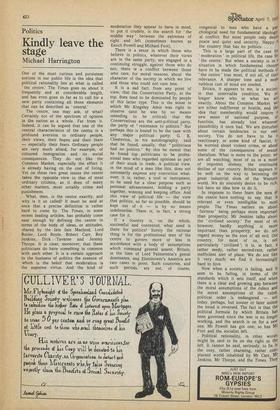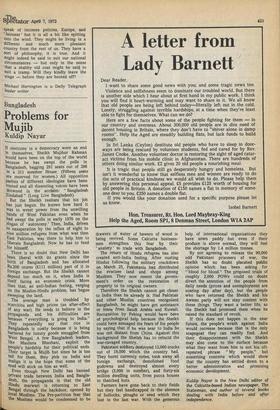Politics
Kindly leave the stage
Michael Harrington
One of the most curious and persistent notions in our public life is the idea that political rationality lies at what is called 'the centre.' The Times goes on about it frequently and at considerable length, and has even gone so far as to call for a new party containing all those elements that can be described as central.'
The centre, one may ask, of what? Certainly not of the spectrum of opinion in the nation as a whole. Far from it. Indeed, it can be argued that one of the central characteristics of the centre is a profound aversion to ordinary people, their views, their hopes and their fears — especially their fears. Ordinary people are very much afraid, for example, of coloured immigration and its social consequences. They do not like the Common Market, especially the effect it is already having on the cost of living. Yet on these two great issues the centre takes the opposite view to that of most ordinary citizens, as it does of many other matters, most notably crime and punishment.
What, then, is the centre exactly, and why is it so called? It must be said at once that a precise definition is rather hard to come by. The Times, in some recent leading articles, has probably come near enough by defining the centre in terms of the body of ideas, or attitudes, shared by the late lain Macleod, Lord Butler, Lord Boyle, Robert Carr, Roy Jenkins, Dick Taverne and Jeremy Thorpe. It is clear, moreover, that these politicians do have something in common with each other. It is a certain approach to the business of politics the essence of which is the belief that moderation is the supreme virtue. And the kind of
moderation they appear to have in mind, to put it crudely, is the search for 'the middle way' between the extremes of right and left (sometimes known as Enoch Powell and Michael Foot), There is a sense in which those who believe in politics, whatever their views are in the same party, are engaged in a continuing struggle, against those who do not; there is a conflict between those who care, for moral reasons, about the character of the society in which we live and those who could not care less.
It is a sad fact, from any point of view, that the Conservative Party, at the top, does tend to be dominated by people of this latter type. This is the sense in which Mr Kingsley Amis was right to observe (and he was by no means intending to be critical) that the Conservatives are the anti-political party, the party of " resistance to politics." But perhaps this is bound to be the case with any major political party. G. K. Chesterton, in his autobiography, said that he found, usually, that "politicians had no politics." By this he meant that he found top politicians to be professional men who regarded opinions as part of their stock in trade. A political view, in the mind of a man like this, does not necessarily express any conviction whatever; it is, rather, a tool or instrument, to be used for a clear purpose such as personal advancement, holding a party together, winning and keeping office. And this view of political life — the view that politics, so far as possible, should be kept out of it — is by no means indefensible. There is, in fact, a strong case for it.
If a country is, on the whole, successful and contented, what need is there for politics? Surely the rational thing is for, the professional men of the centre to govern more or less in accordance with a body of assumptions which command general assent. Britain, in the time of Lord Palmerston's genial dominance, and Eisenhower's America are two cases in point. Such countries, and such periods, are not, of course,
congenial to men who have a paY chological need for fundamental ideologiO al conflict. But most people only desire peace and quiet and security. Happy if the country that has no politics. . . .
This is a large part of the case fOr '
moderation' in political life, the case for 'the centre.' But when a society is in 3 situation in which fundamental choices have to be made the political methods of ' the centre' lose most, if not all, of their relevance. A sharper tone and a more ruthless cast of mind are needed.
Britain, it appears to me, is a socierY in that unenviable condition. We no longer know who or what we are exactly. About the Common Market We are either indifferent or hostile, and the idea that membership would inspire a new sense of national purpose, or function, has already lost whatever plausibility it once had. We are disturbed about certain tendencies in our own society. You do not have to be reactionary, or some kind of fascist, to be worried about violent crime, or about some of the consequences of sexual liberalism. What is more to the point: We are all watching, most of us in a mood of impotent dismay, the continuing decline of our country. Britain appears to be well on the way to becoming the great industrial slum of the Western world. We do sincerely desire to be rich, but have no idea how to do it.
In response to these fears the men of the centre have nothing to say that 13 relevant or even intelligible to most people. The Times natters on about ' fairness ' being perhaps more important than prosperity; Mr Jenkins talks about the 'civilised society.' For most of us, however, hardly anything is more important than prosperity; we do not regard money as the root of all evil. Our country, for most of us, is not particularly ' civilised '; it is, in fact, 8 rather seedy, rather second-rate, rather inefficient sort of place. We do not like it very much; we find it increasinglY hard to love.
Now when a society is failing, and is seen to be failing, in terms of the standards which it sets itself, and when there is a clear and growing gap between the moral assumptions of the rulers and
the moral assumptions of the ruled,
political order is endangered — not today, perhaps, but sooner or later unless the trend is reversed. The fact is that the political formula by which Britain has been governed since the war is no longer working, and the search is on for a nevi one. Mr Powell has got one; so has Mr Foot and the socialist left.
Political rationality, in other words, might be said to lie on the right or the left. It cannot be said, seriously, to lie io the cosy, rather charming, rather corn' placent world inhabited by Mr Carr, Mr Jenkins, Mr Thorpe, and the Times. They Speak of incomes policies, Europe, and fairness ' but it is all a bit like spitting into the wind. They might be living in a different and much more pleasant country from the rest of us. They have a sort of philosophy, it is true. And it might indeed be said to suit our national circumstances — but only in the sense that a shabby old coat might be said, to suit a tramp. Will they kindly leave the stage — before they are booted off?
Michael Harrington is a Daily Telegraph leader writer



































 Previous page
Previous page